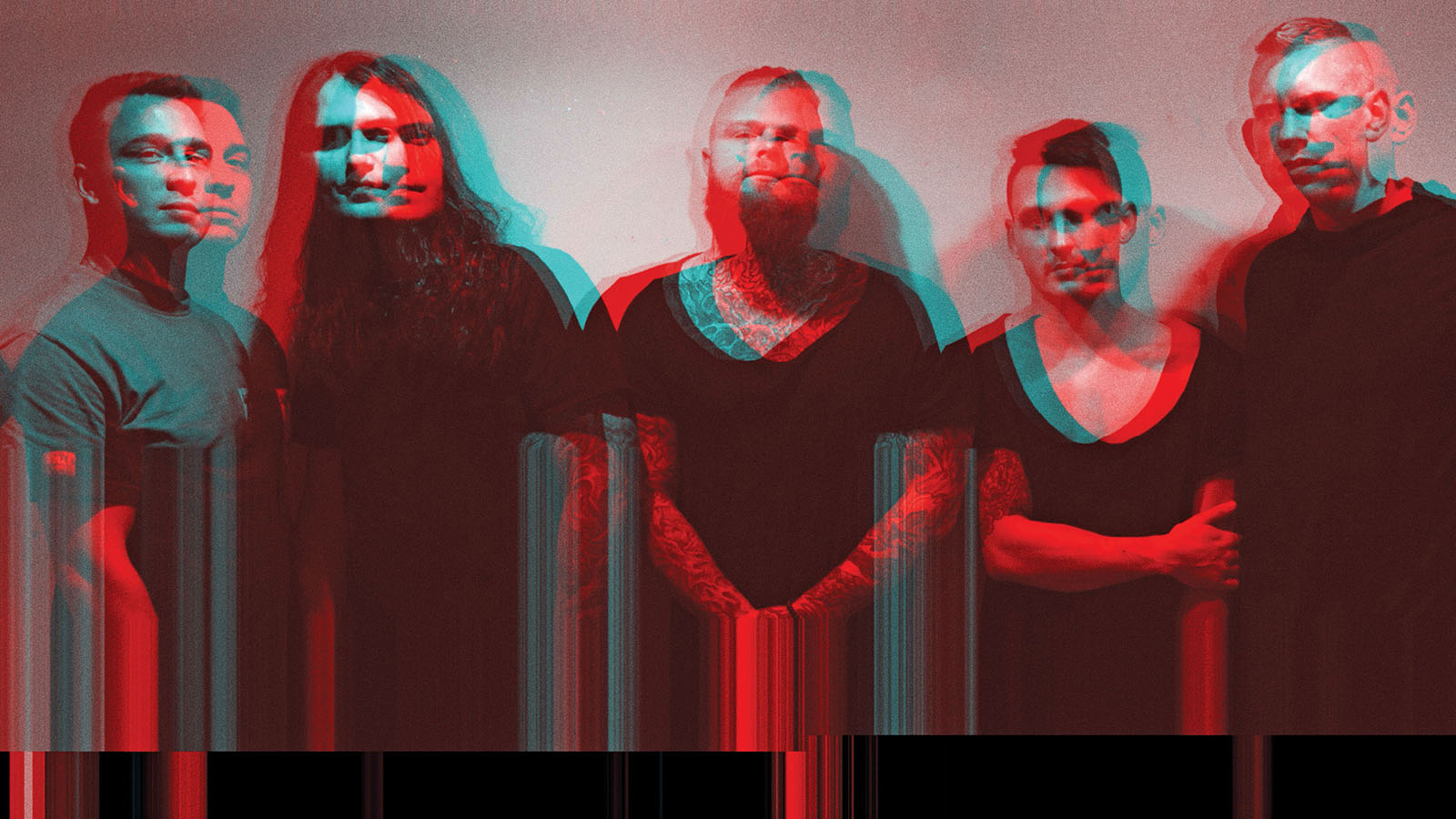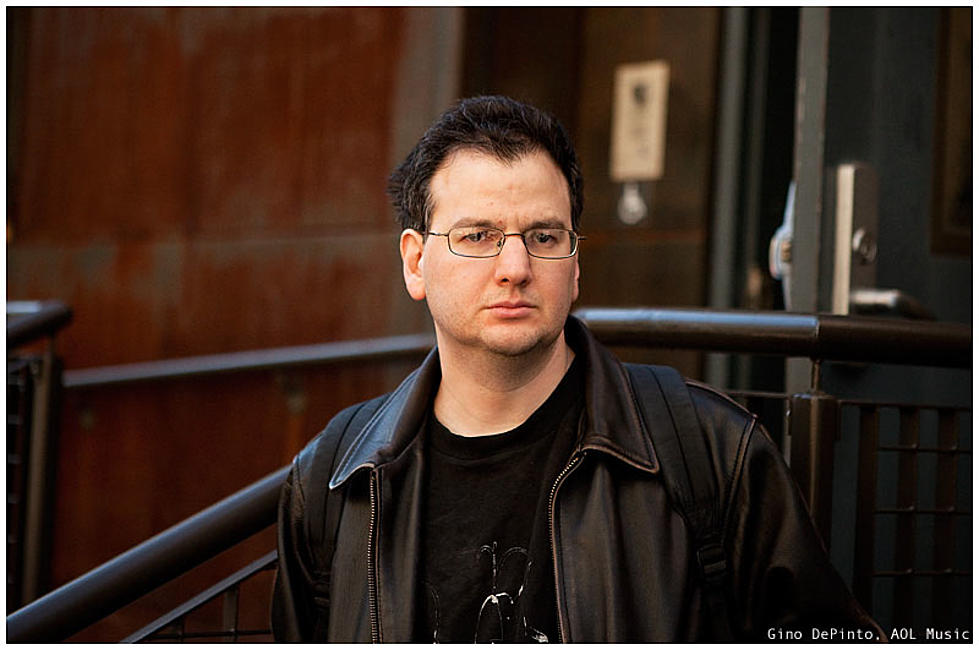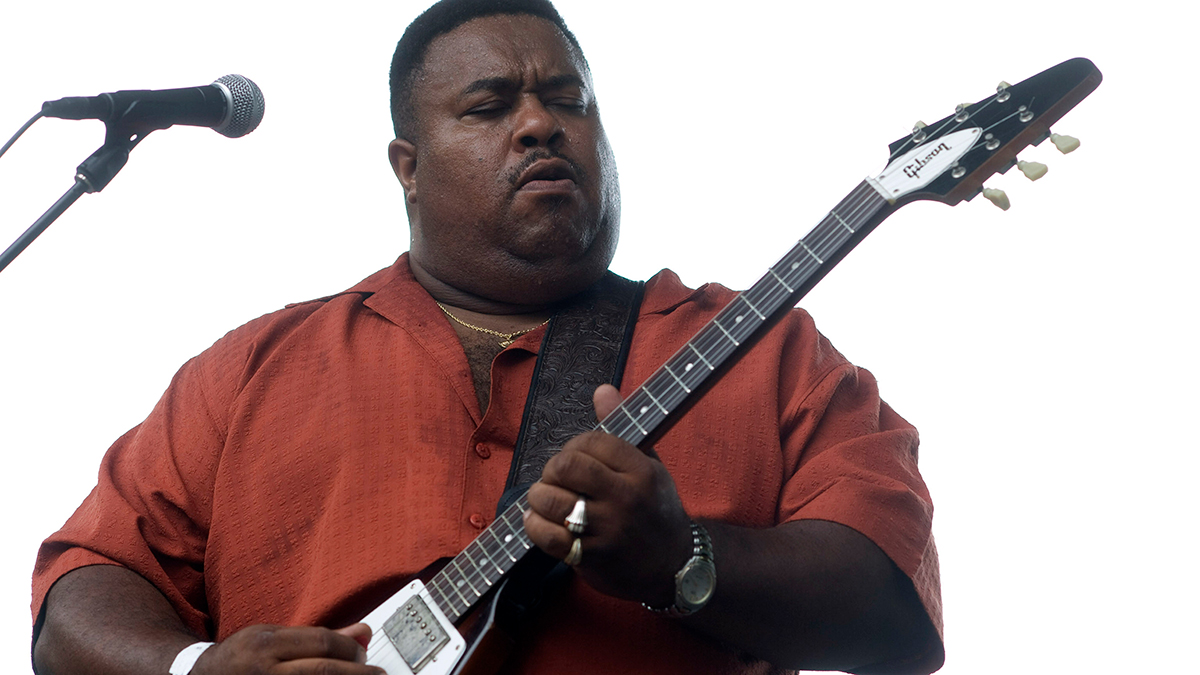How Born of Osiris Guitarist Lee McKinney Made 'The Simulation' a Rocking Reality
Lee McKinney tells GW how he blended fans' desires and wish lists with his band's creative vision to create 'The Simulation.'

Progressive metalcore band Born of Osiris celebrated their 10-year anniversary by completely re-recording their 2007 debut EP The New Reign as The Eternal Reign, and launching a tour to pay tribute to their fans who continued to embrace their earliest effort as their raison d’etre. Now the group is ready to stop living in the past — or at least cease existing in limbo.
Back in December 2017, guitarist, main songwriter and producer Lee McKinney completed Born of Osiris’ fifth full-length, The Simulation, and the band’s label, Sumerian, liked it so much it was left wanting more. Instead of scheduling the album for immediate release, the company asked McKinney if he would write one more song in the vein of the group’s 2013 single “MΔchine” from their third album, Tomorrow We Die Δlive. The song has performed better on streaming services and received more iTunes downloads than any of the band’s other songs, and the label decided a track like that would help would make The Simulation a sure thing.
“I was cool with that,” McKinney says via cell phone while on tour. “I had written the original song so it wasn’t too hard to capture the same vibe. And since I had produced the album, it wasn’t too hard to replicate the tones. After I turned in the song, the label said, ‘This is great! How about another?’”
McKinney wrote and recorded three more songs and tracked the solos and bass parts. However, by the time singers Ronnie Canizaro and Joe Buras wrote new lyrics and recorded the vocals, months had passed. Excited to have the extra material, Born of Osiris’ label suspended the release of The Simulation and encouraged McKinney to fine-tune the entire album to smooth out any rough edges.
“The process really dragged out and it was frustrating,” McKinney says. “A full 13 months passed between the time I finished what I thought was the final record and the actual album that got released. But in the end, it’s almost like a writer with a script or an artist with a painting. If you finish it and then get time away from it and step back into it you can find ways to make it even better.”
The Simulation is a concept album about how digital technology is altering AI and accelerating the path to the singularity; Canizaro and Buras spent many hours making sure the plot was cohesive and accessible while avoiding too many tropes of the AI genre. McKinney took a similarly meticulous approach with the music. Instead of simplifying song structures and downplaying the need for intricate solos as he did on 2015’s Soul Sphere, McKinney re-examined the things fans liked most about the band and integrated them into the songs.
“The reason we’ve been able to make it as a band for 10 years is because of the people that buy our records and go to our shows,” McKinney says. “For a little while, I was almost turning against what fans like about our music, which was silly. So this time, I’ve paid a lot more attention to what people want and balanced that with what I want, so hopefully everybody will come together in the middle and be satisfied.”
All the latest guitar news, interviews, lessons, reviews, deals and more, direct to your inbox!
The reactions to McKinney’s musical modifications have been largely positive. When The Simulation was finally released on January 11, it entered the Billboard Indie Chart at Number 3 and landed at Number 13 on the Billboard Hard Rock chart. In addition, fans have effusively praised the album on Twitter, where McKinney actively chats with followers.
![[from left] Joe Buras, Nick Rossi, Lee McKinney, Ronnie Canizaro and Cameron Losch](https://cdn.mos.cms.futurecdn.net/H7psp9CFNs7WiQBVKvxESd.jpg)
“I just want to say @BOOOfficial has released an incredible album this year and has been on repeat since it dropped. It’s been forever since I listened to a metal album like this,” wrote Jacob Green. “That new album is killer; every song feels like it draws a little bit of influence from a previous release of theirs and it ends up being so diverse. Love it,” echoed Witch King.
For fans of bruising seven-and eight-string riffs, alternate tunings, virtuosic leads and melodic arrangements, The Simulation is a return to Born of Osiris’ shreddy roots and an extension of their modern progressive songwriting. Having played guitar since he was 10, McKinney learned to read music and studied theory before he discovered tabs. He also has studied a variety of styles, including jazz, neo-classical and progressive rock, and has incorporated elements of each into The Simulation.
“Of course, there’s only so much stylistic experimentation you can do with an extreme metal band,” McKinney says. “But I think my love for great songwriting from whatever genre comes across in the band. And when I play a solo, I want it to be something people can walk away singing. Maybe there’s a fast part, but overall I like to think of it as a different instrument that has all these voices I can use to do anything.”
You mentioned that you consciously wanted to create something you thought your fans would like. Doesn’t that put you at risk of not following your creative vision and conforming to what others want to hear?
There’s a fine line. The most important thing is to keep your creative integrity and authenticity, but once you have the music the way you like it, I think you owe it to your fans to at least consider what they like about your band. There’s so much trash talk out there that you can get lost when you read the comments, but the trick is to ignore the stuff that’s just toxic and take into consideration the kind of record people want in an effort to find some middle ground.
Born of Osiris have developed musically from one album to the next. Has the progression been natural or intentional?
I don’t see a difference between those. It happened gradually over time. When A Higher Place came out [in 2009], everyone was like, ‘Oh, the drums are fake,’ which they weren’t at all. They were triggered over, so I understand why people didn’t think they sound real. So, when we did The Discovery [in 2011] we wanted to go shred-crazy just to show how real and complicated the guitar playing was. People really liked that. But then it seemed like metal became a contest for how fast you can play. That drove me crazy. I felt like the music was losing all of its flavor. So we moved on from that.
Is that why you reigned in the solos on 2015’s Soul Sphere?
Since lead guitar became such a focus for everybody, I became almost like that bratty kid at school that rebels against what other people are doing just to be different. I was like, “Well, shit, I’m not gonna play crazy solos just because you want them.” I didn’t want the solos to be the parts of the songs that people talked about. I love writing good songs, not just good solos. That bummed some people out. That’s when I decided one of the big goals with The Simulation was to align what we’ve learned over our touring career with what our fans want from us.
The Simulation contains eight songs. What happened to the other ones you wrote for the album?
The extra songs turned the album into a double release, only it’s all going to be released in two parts. The second batch of songs will come out in the summer sometime. I don’t know why the record company didn’t want to do 16 songs at once, but that’s what they decided was best. Right now, we have six more songs recorded and I have four songs on my desktop that are ready. I’m going to keep writing for the second album so I don’t know how many songs I’ll have by the time it’s ready to come out.
Do you have a huge riff bank that you draw from when you’re writing new music?
I have tons of stuff, but I’m always writing. My wife works a nine-to-five job, so I work nine to five in my studio Monday to Friday just like she does. I treat what I do like a job even when I’m off tour. People go, “Well, I’m having writer’s block. I’ll try again in a month.” I can’t even understand that attitude. For me the solution to being productive is to put in the hours. If you don’t keep what you’ve written, well, at least you’ve tried.
Like many metalcore bands, you play downtuned seven-string and eight-string guitars, but the heaviness and intensity of your sound don’t come exclusively from breakdowns.
I didn’t pick up an eight-string and say, “I want to see how low I can tune this thing and play the heaviest riff known to man.” I was making a song with a somber vibe so I picked up the eight-string for the growl of that low range. I used it a lot to create mood.
How did you decide what guitar to use for a particular song or passage on The Simulation?
If I wanted to make a melodic, happy or beautiful part, I’d pick up a six-string first. Most of my heaviest stuff is on a seven-string, and this album was the first time I used an eight. I was doing a song called “Silence the Echo.” It starts with this somber, spooky riff, and I thought, “Oh, this eight-string is perfect. It’s got the vibe that fits the mood.” I use it as a tool, not just a way to sound heavier.
In the past, you’ve said you disliked eight-string guitars.
I hated eight-string for the bulk of my career. I don’t have monster-sized hands and every eight-string I’d ever played was ridiculously massive. It was like a tree. But I have a deal with Kiesel, which makes my signature six-and seven-string lines. They sent me an eight-string because I was curious. The neck profile is so thin and accessible for me, I felt for the first time like I had an eight-string I could actually play. I’ve always been interested in exploring the possibilities a little more, but I wasn’t going to do it if it didn’t feel good.
You started playing guitar at 10 and by 14 you were playing in the band Before He Dies. Did that kick start your career?
Kind of. I wouldn’t say our songs were any good. It was just me and a buddy writing guitar solos and then then going, “Oh crap, we gotta write songs to go along with these.” We just wanted to play as fast as possible. But that got us a lot of attention from the other bands in the area.
At the time, the other guys were in the equally unheralded bands Your Heart Engraved and Ashes of a Loon. How did you all join forces and form Born of Osiris?
We were all from the Chicago suburbs. Three of the guys went to school together and lived within a mile of each other. They were friends first and it was like they learned instruments to be together. Our three bands were local nothings, but in our little part of the world, we were always playing shows together. So the other guys all decided to play together in one band, and David Da Rocha [from Ashes of a Loon] called me when I was working in a restaurant. He said, “You wanna come try out?” I said, “Yeah, but I’m working. I gotta tell my boss.” So I did and my boss said, “You can’t just leave. I need you.” And I said, “Well, I gotta go, man. You can fire me. You can do whatever but I gotta do this.” He was mad but he decided not to fire me, and it’s a good thing because I really needed the money.
How did the audition go?
It’s funny. At my first try-out, the drummer Cameron [Losch], who also plays guitar, tried me out. He played a hammer-on, pull-off minor pentatonic run. He played it real fast. But since I had taken lessons and knew something about theory, I picked up the guitar and ripped it perfectly the first time. That really impressed him.
You were just 17 when Born of Osiris landed a record deal. Did you contact many labels?
There were a few bands from around Chicago that were playing the same style of music: Veil of Maya, After the Burial and us. A lot of us had worked with producer Michael Keene, who is in the Faceless, which is a band we all like. So when Sumerian signed the Faceless, we all got excited about the label. Then when Sumerian came to town we were like, “Oh, we gotta meet these guys!” Before long, the Faceless, Veil of Maya, After the Burial and us all wound up on the label, which is why people started calling our style of tightly produced metal “Sumeriancore,” but we had all been making music like that before we got signed.
You signed a record deal in high school and started touring soon after.
Since I was only 17 at the time, I wasn’t able to sign our contract until my 18th birthday. Right out of high school, from day one we were on tour. I think the fact that we got an early start contributed to our longevity since we had those early years to make our mistakes, and by the time we had a couple records out we had our heads on straight.
You have a good relationship with Kiesel. They just put out your headless LMX guitar, which is your second line with them. What inspired you to create a headless guitar?
Jeff Kiesel was making a guitar called the Osiris. He wanted my permission to use the name Osiris, which was nice of him and he didn’t have to do. Obviously, I don’t own the name. But I said it was fine with me and he sent me this guitar, which had no headstock. When you lose six or eight inches off the top it’s so crazy how much more portable it becomes. I could play it anywhere. I find myself going on planes and throwing it in the overhead. I really love the practicality and it’s still the same scaling as my other guitar — 25½.
How did that evolve into your new signature model?
Kiesel made a model for me around the time I was starting my solo album [Infinite Mind, out now on Sumerian]. It’s totally different than Born of Osiris — a lot of it is acoustic and I was trying to get really slappy single coil tones. So I told Jeff, “I want to make it as spanky as possible. I want to hear the string as it hits the fret.” He worked with my idea and came up with a great guitar. It has a real ash body, which creates a bright, strong sustain, and it’s got a lot of bite, which helps with the slappy sound I was going for. To take it a step further we developed my bridge pickup, which is very versatile. I’m in a heavy, heavy metal band and that’s not for everybody, so I wanted the guitar to appeal to more people than my music ever could.

How many rhythm tracks did you use for The Simulation?
I did a left and right rhythm. I used the FAS Modern 2 tone from my Fractal Audio Axe-FX II, but then when it was re-amped some of the tones were altered slightly. I don’t like to quad track. I like listeners to be able to hear every aspect of our sound, whether it’s a muted chord or the buzz of a string hitting the fret. And I think those fine details start to disappear when you layer rhythms. I feel like you can get thickness and good tone without having to track a bunch of guitars. It’s one left, one right and one center lead. Then, if I harmonize it I’ll pan those left and right.
Do you pre-write your leads?
I write everything in the studio. I’ll loop a rhythm and jam it forever, and maybe every two times through, there’ll be one little thing I like. So I’ll either make a mental note or I’ll record it and then I keep building from there. I like that freestyle approach. It’s not a one-take thing. A lot of people write in Guitar Pro, and that doesn’t feel normal to me because you lose everything that makes up your identity as a player.
Is a strong picking hand more important to you than a strong fretting hand?
Obviously, they’re both important, but right hand is everything for me. If your left hand can’t keep up with what you’re playing, that’s a problem. But I believe your right hand makes up the majority of your tone, even more than your amp. Guthrie Govan is my favorite guitar player. I’ve seen him pick up his guitar, plug it into a 5-watt practice amp and sound like a god. It’s not about the quality of his gear. He’s gonna sound incredible on whatever he plays.
You’re the sole guitarist onstage with Born of Osiris. Do you have any tricks for keeping the rhythm churning when you solo?
We play to a click track to give us more versatility. The Axe-FX III lets me do harmonies onstage, but if the harmony gets unique and isn’t a dedicated third, I obviously can’t do that by myself so we’ll put it on the click track. And if I need a guitar rhythm to back a solo, that will go on the click as well. We still play everything live, we just add a little bit here and there.
Have you thought of bringing along a second guitarist to tour?
For the last year, it’s been just me. From time to time, I’ve tried out guitarists to play on the other side of the stage, and some of them are incredibly fast — faster than me — but it just doesn’t work because they don’t have the right feel. Maybe I can’t play their music, but I don’t feel they play mine either because it’s not about playing the right note at the right time, it’s how you play the note that makes all the difference in the world. And right now, I feel like I’m the only one that can do that and knows exactly what I want.
Jon is an author, journalist, and podcaster who recently wrote and hosted the first 12-episode season of the acclaimed Backstaged: The Devil in Metal, an exclusive from Diversion Podcasts/iHeart. He is also the primary author of the popular Louder Than Hell: The Definitive Oral History of Metal and the sole author of Raising Hell: Backstage Tales From the Lives of Metal Legends. In addition, he co-wrote I'm the Man: The Story of That Guy From Anthrax (with Scott Ian), Ministry: The Lost Gospels According to Al Jourgensen (with Al Jourgensen), and My Riot: Agnostic Front, Grit, Guts & Glory (with Roger Miret). Wiederhorn has worked on staff as an associate editor for Rolling Stone, Executive Editor of Guitar Magazine, and senior writer for MTV News. His work has also appeared in Spin, Entertainment Weekly, Yahoo.com, Revolver, Inked, Loudwire.com and other publications and websites.

